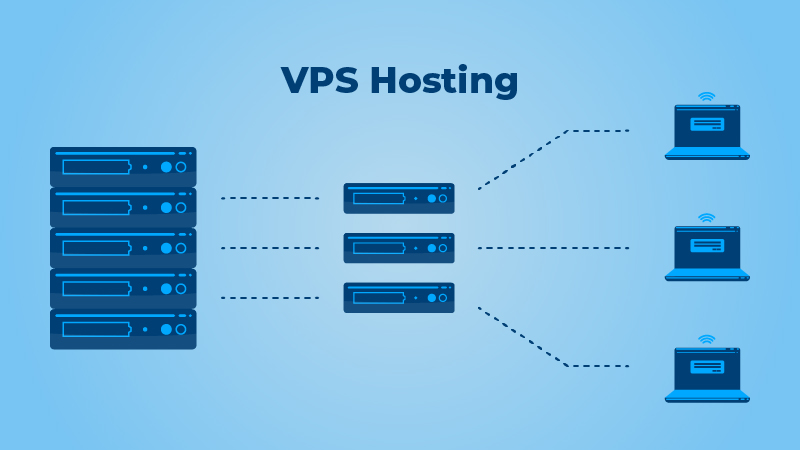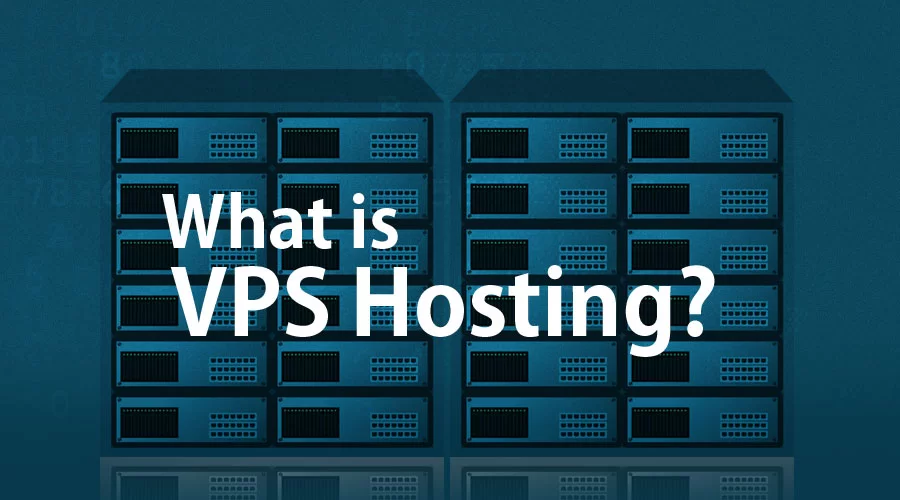Virtual Private Server (VPS) hosting is a powerful and flexible hosting solution that bridges the gap between shared hosting and dedicated servers. In VPS hosting, a physical server is divided into multiple virtual compartments, each functioning as an independent server with its own dedicated resources. This virtualization technology allows users to enjoy the benefits of dedicated hosting, such as customization and control, without the cost associated with a fully dedicated server.

Table of Contents
What is VPS hosting?
Virtual Private Server (VPS) hosting is a type of web hosting service that provides users with a virtualized server environment. In VPS hosting, a single physical server is partitioned into multiple virtual servers, each acting as an independent and isolated unit with its own dedicated resources. These virtual servers operate with their own operating systems, allowing users to have more control and customization compared to shared hosting.

Why Opt for VPS Hosting?
Opting for VPS (Virtual Private Server) hosting offers several advantages, making it a preferred choice for many businesses and individuals. It is a strategic choice for those who seek a hosting solution that combines the advantages of dedicated resources, customization, scalability, and enhanced security without the high costs associated with dedicated servers.
9 Factors to Consider When Choosing a VPS Hosting Plan
Choosing the right Virtual Private Server (VPS) hosting provider is crucial for the performance, security, and overall success of your website or application. Here are some key factors to consider when selecting a VPS hosting provider:
Performance and Resources
Performance and resources are crucial factors when selecting a hosting provider. VPS hosting providers, carefully review the specifications of their plans, including CPU cores, RAM, storage type, and bandwidth. Additionally, consider their track record for server uptime and performance based on user reviews and testimonials. Choosing a VPS that aligns with your performance requirements is fundamental to the success of your online presence.

- Evaluate the hardware specifications such as CPU, RAM, and storage space offered by the VPS plans.
- Consider the virtualization technology used (e.g., KVM, OpenVZ) as it can impact performance.
- Look for providers that offer scalable resources so you can easily upgrade as your needs grow.
Reliability and Uptime
When selecting a VPS hosting plan, prioritize providers that guarantee 99.9% uptime and operate from multiple data center locations to minimize redundancy issues. These combined factors significantly enhance your website’s stability, reliability, and overall performance, cultivating a positive user experience and safeguarding your online reputation.
Operating System Options
Selecting the operating system (OS) for your VPS is pivotal for optimizing performance and ensuring compatibility. VPS hosting plans typically offer a choice between Windows and Linux options. Ensure that the hosting provider supports the operating system you need for your applications. Common options include Linux distributions (e.g., Ubuntu, CentOS) and Windows.
Linux-based VPS hosting is renowned for its security, stability, and cost-effectiveness, making it suitable for a diverse array of websites and applications. On the other hand, Windows-based VPS hosting is preferred by users requiring compatibility with specific Windows-based software applications.
Scalability
Scalability is a fundamental and crucial feature to consider when choosing VPS hosting. The ability to scale resources up or down according to the evolving needs of your website or application. it’s essential to assess their scalability options, the ease of scaling resources, and any associated costs. A hosting solution that can seamlessly grow with your project or business is a valuable asset in ensuring the long-term success and performance of your online presence.
Management and Support
When evaluating VPS hosting plans, a key decision revolves around choosing between managed and unmanaged options. Managed VPS hosting plans offer convenience by taking care of various technical aspects for you, including server maintenance, security updates, and troubleshooting setups. These plans are ideal for individuals or businesses aiming to concentrate on content creation, website growth, and overall development without delving into the intricacies of server management.
On the other hand, unmanaged VPS plans provide a higher level of customization and control. With this choice, users have the flexibility to configure the server environment based on their specific needs. However, it comes with the responsibility of handling security configurations, software installations, and regular maintenance tasks. Unmanaged plans are suitable for users with technical expertise who prefer a hands-on approach to server management.
In summary, the decision between managed and unmanaged VPS hosting plans depends on your technical proficiency and the level of control you desire over server-related tasks. Managed plans cater to those seeking convenience, while unmanaged plans are tailored for users who value customization and are comfortable taking on additional responsibilities related to server administration.
Security Features
When exploring VPS plans, security becomes a crucial aspect of your digital landscape that demands attention. Assess the security features provided by your hosting provider, checking for elements such as DDoS protection, firewalls, routine backups, and SSL certificates.
These security features are instrumental in ensuring that your hosting provider effectively combats cyber threats, acting as a protective barrier between your server and potential dangers by filtering out malicious traffic. Additionally, prioritize plans that offer regular backups as they play a vital role in data recovery during unforeseen events. Choose a hosting plan that includes automated backup routines and straightforward restoration options for added peace of mind.
Cost and Value
Evaluating and comparing budgets is vital for striking a balance between costs and the features you need. Compare the components of various plans against their respective costs to determine the best value that aligns with your budget. Additionally, scrutinize for any additional fees and carefully analyze the terms and conditions to avoid unexpected surprises.
Furthermore, take into account the duration of the hosting contract. Although longer-term commitments might present cost savings, make sure you are comfortable with the level of commitment before committing to a particular plan. This approach ensures that you make an informed decision that not only fits your budget but also meets your specific hosting requirements.
Backup and Restore Options
Enhancing the reliability of your site is crucial, and having a robust backup system is generally advisable. It’s important to confirm that your VPS host has an effective backup mechanism in place. Although many hosting companies offer backup services, the details can vary.
Consider aspects such as the frequency of backups, the duration of the data retention period, the ease of data restoration from backups, whether the process is automated, the possibility of customizing scheduling, and more.
A hosting plan with a diverse range of backup options is typically more advantageous. However, it’s worth noting that this feature can also be implemented at the account level, so it may not need to be the primary focus when selecting a plan. Nevertheless, the more flexibility and options available, the better the backup strategy can align with your specific needs and contribute to the overall reliability of your website.
Reviews and Reputation
Reviews and reputation are indeed key factors when choosing a VPS hosting provider. It look for reviews and testimonials from other users to get an idea of the provider’s reputation and customer satisfaction. By carefully considering these factors, you can choose a VPS hosting provider that meets your specific requirements and provides a reliable and efficient hosting environment for your website or application.
Final Thoughts
Selecting a robust partner for your web hosting requirements is crucial for website owners. Neglecting to opt for a dependable VPS service provider can result in significant consequences down the line. Compile a list of the most critical aspects for your site to guide your evaluation process. Then, compare these requirements against the offerings of different service providers. Keep in mind that cost isn’t the sole consideration, and excessive cost-cutting in hosting expenses may result in increased time spent resolving issues in the future.

